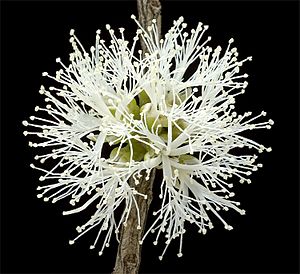Hidden honey-myrtle facts for kids
Quick facts for kids Hidden honey-myrtle |
|
|---|---|
 |
|
| Scientific classification | |
| Genus: |
Melaleuca
|
| Species: |
undulata
|
The Hidden Honey-Myrtle (scientific name: Melaleuca undulata) is a cool shrub. It belongs to the myrtle family, called Myrtaceae. You can only find it in the southern part of Western Australia. This means it's endemic there, like a special local plant! It's a bushy plant that spreads out. It has pretty creamy-white flowers that grow in small groups.
Contents
What it Looks Like
The Hidden Honey-Myrtle usually grows to be about 0.3–2 m (1–7 ft) tall. It can spread out quite wide, up to 2 m (7 ft) or even more.
Its leaves grow in an alternating pattern along the stems. They are mostly shaped like a spear or an oval. Each leaf is about 3–15 mm (0.1–0.6 in) long. They are also about 1.5–4 mm (0.06–0.2 in) wide. The leaves feel a little bit hairy.
The flowers grow in small clusters or "heads." These heads can be up to 27 mm (1 in) across. You can find them scattered along the branches. Each cluster has between 1 and 18 flowers.
The flowers are usually white or cream-colored. They mostly bloom from October to March. Inside each flower, there are groups of stamens. These are the parts that hold pollen. There are five bundles of stamens, and each bundle has 8 to 30 stamens. The bottom part of the flower is smooth. It is about 1.2–2.5 mm (0.05–0.1 in) long. After the flowers, the plant makes woody seed pods. These pods are about 2.5–4 mm (0.1–0.2 in) long.
Name and History
The scientific name Melaleuca undulata was first officially described in 1867. This was done by a scientist named George Bentham. He wrote about it in a book called Flora Australiensis.
The second part of its name, undulata, comes from a Latin word. Undulatus means "wavy." This name was chosen because the edges of the plant's leaves are often wavy.
Where it Grows
This special melaleuca plant is found in a specific part of Western Australia. You can see it from the Stirling Range and Broomehill area. It also grows eastwards towards the Israelite Bay area.
It likes to grow in areas with mallee trees and heathland. You might find it in swampy spots or along river beds. It also grows on the edges of clay pans. It can grow in sand, clay, and even on gravelly soil called laterite.
Looking After the Plant
The Government of Western Australia has a group called the Department of Parks and Wildlife. They have looked at the Hidden Honey-Myrtle. They say it is "not threatened." This means there are enough of these plants, and they are not in danger of disappearing.
How People Use It
The Hidden Honey-Myrtle is a strong and tough plant. People sometimes use it in gardens. It can make a good low hedge, which is like a natural fence. It's a bit prickly, so it can keep things out. This plant can grow well in most types of soil and in different sunny or shady spots.

